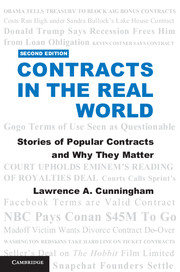Book contents
- Frontmatter
- Dedication
- Contents
- Annotated Contents
- Acknowledgments
- Introduction
- 1 Getting In: Contract Formation
- 2 Facing Limits: Unenforceable Bargains
- 3 Getting Out: Excuses and Termination
- 4 Paying Up: Remedies
- 5 Rewinding: Restitution and Unjust Enrichment
- 6 Writing It Down: Interpretation, Parol, Frauds
- 7 Performing: Duties, Modifi cation, Good Faith
- 8 Hedging: Conditions
- 9 Considering Others: Third Parties and Society
- Conclusion
- Appendix A Offering and Accepting
- Appendix B Buying and Selling Goods
- Notes
- Table of Cases
- Index
2 - Facing Limits: Unenforceable Bargains
Published online by Cambridge University Press: 05 March 2016
- Frontmatter
- Dedication
- Contents
- Annotated Contents
- Acknowledgments
- Introduction
- 1 Getting In: Contract Formation
- 2 Facing Limits: Unenforceable Bargains
- 3 Getting Out: Excuses and Termination
- 4 Paying Up: Remedies
- 5 Rewinding: Restitution and Unjust Enrichment
- 6 Writing It Down: Interpretation, Parol, Frauds
- 7 Performing: Duties, Modifi cation, Good Faith
- 8 Hedging: Conditions
- 9 Considering Others: Third Parties and Society
- Conclusion
- Appendix A Offering and Accepting
- Appendix B Buying and Selling Goods
- Notes
- Table of Cases
- Index
Summary
A legal order can indeed be characterized by the agreements which it does or does not enforce.
– Max WeberUnconscionability: Gail Waters's Annuity Swap
When Gail Waters was twelve years old, she had a bad accident and fought a resulting legal battle for six years, finally settling for cash. With that money, she bought an annuity from Commercial Union Insurance Company. It would pay annual amounts totaling $694,000 over its twenty-five-year life and could be surrendered on any given day for cash of $189,000. At twenty-one, Gail became involved with an ex-convict, Thomas Beauchemin, who turned her to drugs and ran up $6,000 in charges on her credit card, hitting its limit. Thomas, aware of Gail's annuity, put the idea into her head of selling it to some friends of his, David DeVito, Robert DeVito, and Michael Steamer, for $50,000.
Thomas worked out details for Gail, who was then naïve, insecure, and vulnerable. The others used a licensed lawyer for the trade. They sealed the swap and signed the papers in a parking lot of a restaurant. As part of the deal, the DeVitos and Steamer forgave debts Thomas owed them of $7,000. Later, Gail regretted the deal and refused to turn over the annuity. She asked a Massachusetts court to declare it invalid.
The DeVitos and Steamer invoked a fundamental principle of contract law: Courts typically do not inquire into the adequacy of consideration. Instead, they let people make exchanges on whatever terms they wish. The idea that courts do not inquire into the adequacy of consideration is as old as the idea of consideration itself, enforced as early as 1587. People can trade hats for cars, documents for cash, or feathers for skyscrapers. Relative magnitudes are irrelevant, so even the “slightest consideration is sufficient to support the most onerous obligation.”
Several justifications explain. After all, in most commercial transactions, there is a rough equivalence of values given and received – such as a car for cash. The law recognizes the importance of leaving room for people to make trades for many different reasons, such as to gain advantages, real or perceived. Because people assign different values to identical things, it would undermine principles of a free market to have judges second-guess the equivalence of trades. So our courts never have.
Information
- Type
- Chapter
- Information
- Contracts in the Real WorldStories of Popular Contracts and Why They Matter, pp. 49 - 72Publisher: Cambridge University PressPrint publication year: 2016
